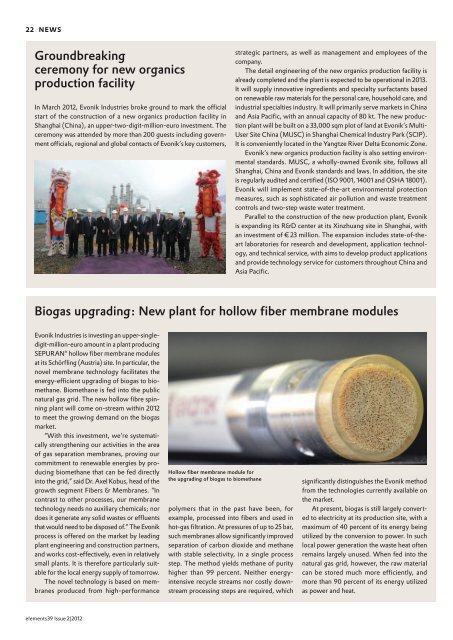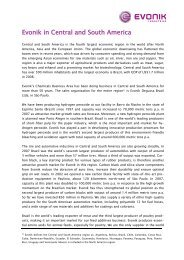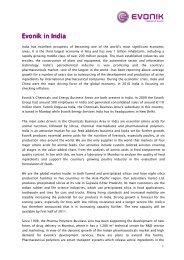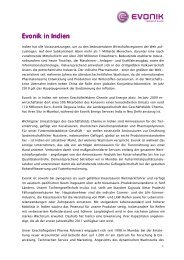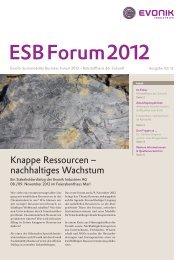Download - Evonik Industries
Download - Evonik Industries
Download - Evonik Industries
You also want an ePaper? Increase the reach of your titles
YUMPU automatically turns print PDFs into web optimized ePapers that Google loves.
22 neWs<br />
Groundbreaking<br />
ceremony for new organics<br />
production facility<br />
In March 2012, <strong>Evonik</strong> <strong>Industries</strong> broke ground to mark the official<br />
start of the construction of a new organics production facility in<br />
Shanghai (China), an upper-two-digit-million-euro investment. The<br />
ceremony was attended by more than 200 guests including government<br />
officials, regional and global contacts of <strong>Evonik</strong>’s key customers,<br />
elements39 Issue 2|2012<br />
strategic partners, as well as management and employees of the<br />
company.<br />
The detail engineering of the new organics production facility is<br />
already completed and the plant is expected to be operational in 2013.<br />
It will supply innovative ingredients and specialty surfactants based<br />
on renewable raw materials for the personal care, household care, and<br />
industrial specialties industry. It will primarily serve markets in China<br />
and Asia Pacific, with an annual capacity of 80 kt. The new production<br />
plant will be built on a 33,000 sqm plot of land at <strong>Evonik</strong>’s Multi-<br />
User Site China (MUSC) in Shanghai Chemical Industry Park (SCIP).<br />
It is conveniently located in the Yangtze River Delta Economic Zone.<br />
<strong>Evonik</strong>’s new organics production facility is also setting environmental<br />
standards. MUSC, a wholly-owned <strong>Evonik</strong> site, follows all<br />
Shanghai, China and <strong>Evonik</strong> standards and laws. In addition, the site<br />
is regularly audited and certified (ISO 9001, 14001 and OSHA 18001).<br />
<strong>Evonik</strong> will implement state-of-the-art environmental protection<br />
meas ures, such as sophisticated air pollution and waste treatment<br />
controls and two-step waste water treatment.<br />
Parallel to the construction of the new production plant, <strong>Evonik</strong><br />
is expanding its R&D center at its Xinzhuang site in Shanghai, with<br />
an investment of € 23 million. The expansion includes state-of-theart<br />
laboratories for research and development, application technology,<br />
and technical service, with aims to develop product applications<br />
and provide technology service for customers throughout China and<br />
Asia Pacific.<br />
Biogas upgrading: new plant for hollow fiber membrane modules<br />
<strong>Evonik</strong> <strong>Industries</strong> is investing an upper-singledigit-million-euro<br />
amount in a plant produc ing<br />
SEPURAN® hollow fiber membrane mod ules<br />
at its Schörfling (Austria) site. In particular, the<br />
novel membrane technology facilitates the<br />
energy-efficient upgrading of biogas to biomethane.<br />
Biomethane is fed into the public<br />
natural gas grid. The new hollow fibre spinning<br />
plant will come on-stream within 2012<br />
to meet the grow ing demand on the biogas<br />
market.<br />
“With this investment, we’re systematically<br />
strengthening our activities in the area<br />
of gas separation membranes, proving our<br />
commitment to renewable energies by producing<br />
biomethane that can be fed directly<br />
into the grid,” said Dr. Axel Kobus, head of the<br />
growth segment Fibers & Membranes. “In<br />
contrast to other processes, our membrane<br />
tech nology needs no auxiliary chemicals; nor<br />
does it generate any solid wastes or effluents<br />
that would need to be disposed of.” The <strong>Evonik</strong><br />
process is offered on the market by leading<br />
plant engineering and construction partners,<br />
and works cost-effectively, even in relatively<br />
small plants. It is therefore particularly suitable<br />
for the local energy supply of tomorrow.<br />
The novel technology is based on membranes<br />
produced from high-performance<br />
Hollow fiber membrane module for<br />
the upgrading of biogas to biomethane<br />
polymers that in the past have been, for<br />
example, processed into fibers and used in<br />
hot-gas filtration. At pressures of up to 25 bar,<br />
such membranes allow significantly improved<br />
separation of carbon dioxide and methane<br />
with stable selectivity, in a single process<br />
step. The method yields methane of purity<br />
higher than 99 percent. Neither energyintensive<br />
recycle streams nor costly downstream<br />
processing steps are required, which<br />
significantly distinguishes the <strong>Evonik</strong> method<br />
from the technologies currently available on<br />
the market.<br />
At present, biogas is still largely converted<br />
to electricity at its production site, with a<br />
maximum of 40 percent of its energy being<br />
utilized by the conversion to power. In such<br />
local power generation the waste heat often<br />
remains largely unused. When fed into the<br />
natural gas grid, however, the raw material<br />
can be stored much more efficiently, and<br />
more than 90 percent of its energy utilized<br />
as power and heat.


